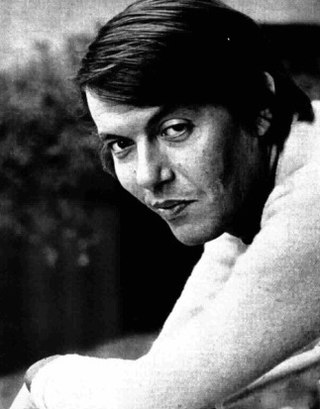
Fabrizio Cristiano De André was an Italian singer-songwriter and the most-prominent cantautore of his time. His 40-year career reflects his interests in concept albums, literature, poetry, political protest, and French music. He is considered a prominent member of the Genoese School. Because of the success of his music in Italy and its impact on the Italian collective memory, many public places such as roads, squares, and schools in Italy are named after De André.
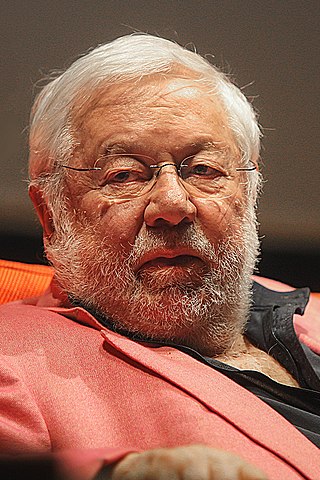
Paolo Villaggio was an Italian actor, writer, director and comedian. He is noted for the characters he created with paradoxical and grotesque characteristics: Professor Kranz, the ultra-timid Giandomenico Fracchia, and the obsequious and meek accountant Ugo Fantozzi, perhaps the favourite character in Italian comedy. He wrote several books, usually of satirical character. He also acted in dramatic roles, and appeared in several movies.

Fiorella Mannoia is an Italian singer, songwriter and actress.
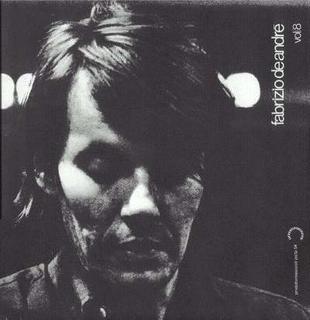
Volume 8 is an album released by Italian singer/songwriter Fabrizio De André. It was first issued in 1975 on Ricordi and then re-released by BMG. According to statements by De André within his posthumous autobiography "Una goccia di splendore" ["A drop of brightness"], released in 2011, his collaboration with Francesco De Gregori, which gave birth to four of the eight songs on the album, originated when De André saw his colleague live on stage in Rome and was very impressed. Afterwards, he invited De Gregori to visit him in his rural house in Sardinia, where the two of them spent a month "getting drunk together and writing songs in the meantime."

Rimini is an album released by Italian singer/songwriter Fabrizio De André. It was first issued in 1978 on Ricordi and then re-released by BMG. The songs were written by Fabrizio De André and Massimo Bubola. Two of them are De André's first forays into overtly political themes, which will be a recurring subject of his in later years. The album is also the only one in De André's output to include two fully instrumental tracks with no lyrics and no vocals.
Piero Milesi was an Italian musician, composer, and music arranger.

Fabrizio De André is an album released by Italian singer-songwriter Fabrizio De André, in 1981. The songs were written by De André and Massimo Bubola. It is also known as L'Indiano due to the picture of a Native American on the cover. The picture is a painting by Frederic Remington named The Outlier. The title of the painting and its author are not credited on the cover – neither in the original pressing nor in any of the subsequent reprints of the album on CD or vinyl.
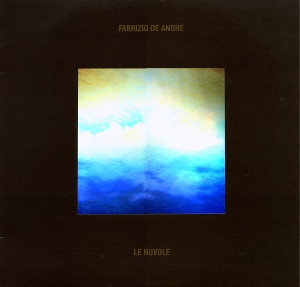
Le nuvole is an album by Italian singer-songwriter Fabrizio De André, released in 1990. The songs were written by Fabrizio De André and Mauro Pagani. As Pagani revealed in an interview within the 2011 DVD biographical documentary series Dentro Faber, he is responsible for the writing of most of the music, while De André wrote all of the lyrics – except for Don Raffaè, detailed below, whose lyric writing is shared between De André and singer-songwriter Massimo Bubola, and the lyrics to the two songs in Genoese on side B, "Mégu megún" and "'Â çímma", which De André co-wrote with fellow Genoan Ivano Fossati because, according to De André, his colleague's ability to play with the sounds and the inner melodies of the Genoese dialect was much better than his own. Pagani's collaboration with De André, always according to the Lombard musician, happened in an identical way for De André's previous album, Crêuza de mä, with Pagani setting to music De André's already fully written lyrics, on the basis of a few melodic ideas from the latter. His next songwriting collaboration with Fossati, on Anime salve, would be more equally balanced, with he and Fossati composing music by actually playing together.

Paolo Buonvino is an Italian composer, musician, conductor, and music arranger.
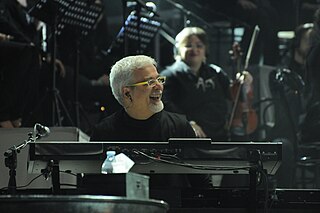
Danilo Madonia is an Italian musician, composer, producer and arranger.
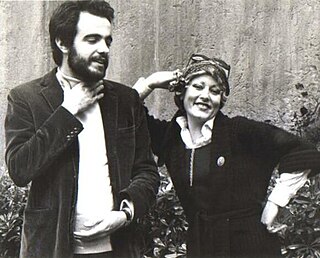
Manuel De Sica was an Italian composer.

Sonia Bergamasco is an Italian actress.
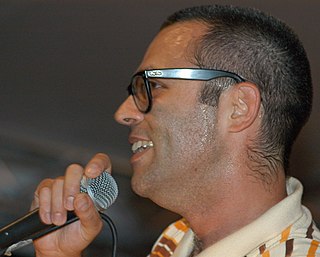
Francesco Di Gesù, better known by his stage name Frankie Hi-NRG MC, is an Italian rap and hip hop artist of Sicilian descent, born in Turin and raised between Caserta and Città di Castello. He has been active since the early stages of the Italian hip hop movement in the early 1990s and is regarded as one of the pioneers of the genre. He predominantly discusses politics and societal issues in his music, his debut single "Fight da faida" complains about various issues, including the Mafia and its ties with Italian politicians, the Ustica massacre, the Bologna massacre and the Operation Gladio. He has also participated in the Sanremo Music Festival in 2008 with his song "Rivoluzione" and again in 2014 with "Pedala" and "Un uomo è vivo".

Una storia sbagliata is a song written and recorded by Italian singer-songwriter Fabrizio De André and co-composed with folk songwriter Massimo Bubola. It was initially released as a single backed with "Titti". Both songs were recorded during the initial sessions for De André's self-titled 1981 album and first released in 1980 as a standalone single. In 1999, "Una storia sbagliata" was re-released within the Fabrizio De André: Opere complete box set. "Titti" had its first CD release in 2005, within the greatest hits and rarities collection In direzione ostinata e contraria.

Il pescatore ["The fisherman"] is a song by Fabrizio De André, with lyrics by himself and music by composers Gian Piero Reverberi and Franco Zauli. Backed with "Marcia nuziale", De André's translation of by Georges Brassens's 1957 song "La marche nuptiale", it was released in 1970 by the Italian branch of Liberty Records as a standalone single, De André's first of only two such releases in his career. It was the first single of De André to enter the Italian singles chart, peaking at the 13th position. Its popularity was significantly boosted by a 1979 live remake, with PFM backing De André in a new rock arrangement.

Fabrizio De André in Concerto - Arrangiamenti PFM ["In Concert—Arrangements by PFM"] is a 1979 live album by Fabrizio De André featuring Italian progressive rock band Premiata Forneria Marconi, also known as PFM, as his backing band, recorded during their successful 1979 tour of Italy and Europe. Built on powerful, complex and carefully crafted rock arrangements, either by single band members or by the band as a unit, the album marked a significant stylistic and musical departure for De André, whose output up to that point had always employed acoustic-based, folk arrangements, occasionally branching into pop but never overtly using rock structures and instrumentation. Upon release, the album became immediately very popular and paved the way for other Italian singer-songwriters for their own transition from a folk style into a more rock-oriented one. The album was followed by a Volume 2 the next year, recorded during the same shows.

Fabrizio De André in Concerto, also known as L'ultimo concerto ["The last concert"] or simply In Concerto, is a DVD and concert film by Italian singer-songwriter Fabrizio De André, chronicling two February 1998 shows at Teatro Brancaccio in Rome during his successful 1997–1998 Anime salve Italian tour, promoting his same-titled 1996 album. The shows are De André's last filmed ones before his death in January 1999, although not his very last: the tour, indeed, lasted until August 1998, when De André had to stop it because of the first symptoms of a recurring illness, later diagnosed as lung cancer. The DVD, originally filmed as a TV broadcast on RAI, was directed by Mimma Nocelli and longtime De André collaborator Pepi Morgia, and produced by Dori Ghezzi, who released it in 2004 on her own label Nuvole Productions.

De André canta De André - Cristiano De André Live ["DeA sings DeA"] is a live tribute album by Cristiano De André, consisting of updated covers and remakes of songs written and originally performed by his late father Fabrizio De André, recorded during Cristiano's 2009-2010 tour of Italy and released as a CD+DVD bundle. Similarly to De André Senior's 1979-1980 release In Concerto - Arrangiamenti PFM, it was followed by a Volume 2 in 2010, recorded during the same shows and released in the same 2-disc format.
The Targa Tenco is a prize awarded annually by the Club Tenco. Founded in 1984, it has a large jury of 200 journalists and critics awarding the best works of the year. It is considered the most prestigious award in Italian music.
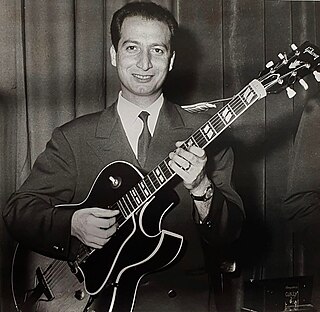
Ernesto Massimo Verardi, is an Italian guitarist and composer.



















